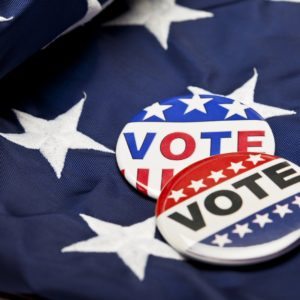For years, Native Americans have been seen as a solidly Democratic voting block. This year, three women are trying to change that stereotype, running for state level offices as Republicans. They push back on the idea that reservation voters need to lean Democratic or that tribal concerns are primarily tied to environmental issues and have instead found ways to make an appeal to voters both on and off of the reservation.
“What we found is that, in the younger generation of Republicans, because there are so many of us who are multi-racial, we are finding that there can be a lot of similarities,” says Kirsten Johnson, who is running for District 50A in the Minnesota House of Representatives. “Just explaining things like why I am a Republican to other Native Americans, they go, ‘Huh, that makes sense.'”
“And on the flip side, when you go to Republicans and say, ‘Here are this issues that are important to Natives that haven’t been looked at,’ they [also agree]…. It’s not all handouts and we hate the right, it’s that they have never really listened to each other,” she continued.
Donna Bergstrom, who is running for lieutenant governor in Minnesota, agrees, stressing that many Native American values, including holding life as sacred from childhood to old age, fit well within the Republican platform. Despite what can seem like a natural fit, so far, native voices haven’t been formally organized.
“It would be really great if there was a native platform,” says Andria Tupola, the Republican candidate for governor of Hawaii, “because then we could just say it. Native women who were running for office could just say that these are the things that Republicans believe for native people.”
Instead, the candidates have been finding ways to share the elements of the Republican platform that they think will resonate, focusing on issues like regulation, housing, jobs, and returning authority to the local level.
“I think that people view Republicans as the colonizers, as people who were the land-taker-awayers and…you can’t change that history. What happened in the past happened, but what principles of the Republican platform do resonate with natives? Well, I would say less government, free markets… supporting local initiatives and businesses,” says Tupola.
Bergstrom agrees, speaking strongly about the need to protect the American constitutional republic in order to help protect tribal authority.
“We are inextricably linked together, the tribes and the Constitution,” she says, explaining that tribal governments are one of the only three forms of government explicitly mentioned in the Constitution.
“What we have now is a power inequality. We can have power equality in a representative republic, whereas we can’t have that in a socialist structure,” she continued. “We need a strong state to defend native voices.”
One of the themes that returns when talking to the three women is the sense of mixed heritage. While maintaining their tribal identity, many Native Americans are proud U.S. citizens as well. Bergstrom noted that Native Americans are over-represented in American military service. In fact, both she and Johnson are military veterans. Tupola was the first women of Samoan background to be elected to the Hawaiian legislature.
They also share a sense of obligation, stressing that they ran because they were asked to, and a focus on local issues. For both Bergstrom and Tupola, cost of living issues in their home communities are a major concern. Meanwhile, Johnson says that she decided to run for the state house after learning that the native caucus at the state legislature was at risk of falling apart while women and veterans also were underrepresented.
At the same time, the women admit that their reception has been mixed, in part because the national party has never made a push for native votes a major focus.
“I think if we were able to say it [people would be responsive,] but it’s just like anything else, you have to work really hard at getting your message out,” says Tupola. “People can twist it, people can change it, if you don’t drop enough money in it than people don’t get it. It is a messaging that I dream one day that we could have, but it would really take some inertia, not just on the part of natives, but on the part of the party to say this is what we’re about.”
In other cases, the tribes themselves have become hostile towards the party. Bergstrom described how she found it difficult to get invited to speak before some tribal groups.
“There is a bit of a gatekeeper mentality within the tribes,” says Bergstrom, “if they welcomed everyone, we would have better luck [getting opportunities to speak before tribal groups.]”
Even so, she says that she has been welcomed by the Red Lake reservation and has spoken to other native groups around the state. Johnson, whose district does not include any reservation land, describes a similar experience, finding a warm reception from local groups in her district.
The candidates themselves may share values and positions, but in the end, each race is unique and focuses on relatively specific local issues. Tupola is concerned about an acute housing shortage in Hawaii and an increasing cost of living. Bergstrom worries that Minnesota is slipping towards socialism, and Johnson says she wants to help making working class housing more available in her district.
All three Republican candidates are in uphill races, made even more difficult by the anti-GOP mood of the midterm electorate. But by pushing their party to focus on Native American issues, they are already having an impact on American politics.

